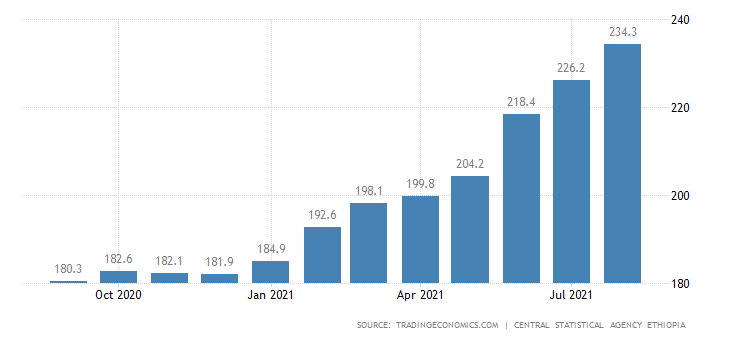
There is no doubt now that Ethiopia is now in an irreversible state of economic collapse and fragmentation under Abiy Ahmed’s government. Instead of addressing the everyday problems of the people he has caused millions to be displaced, killed, starving, and put Ethiopia in severe debt spending all the countries assets on a failed military adventure.
Everyday consumer items such as diapers, enjera, petrol, vegetables, clothes, etc. have doubled or tripled in price. People are waiting hours to buy a limited amount of fuel for their cars. Although the official government exchange rate of birr to dollar is 45 yesterday it was reported to be 67 and many forecasters predict it will approach 77 in the near future.
Although over 5 million are starving in Tigray it is now estimated that more than 1 in 4 Ethiopians are suffering food shortages. Locusts, war, changing rain patterns, displacement, lack of government funding for seeds and agricultural necessities giving way to war needs all will result in poor harvests for the foreseeable future. Abiy Ahmed has turned the whole government into a war machine neglecting the needs of noncombatants.
War and unrest in Oromia, million displaced in Amhara, and lack of hope for peace in the near future is killing any and all export trade. European and American sanctions on Ethiopian exports coupled with escalating prices on imports cannot be sustained much longer. Roads to Kenya and Djibouti are currently blocked by war impeding export and import to only air means. Growing world wide displeasure with Ethiopian Airlines is making it hard for the airline to make enough cash to pay off the monthly loans and leases on its aircraft. There are new calls from many African countries that they have been too dependent on one airline and now wish to develop others.
Noted Ethiopian scholar Alex De Waal in July noted that there are five mechanisms apart from military strategies that would play a role in the collapse of the Ethiopian state. Ethiopia’s decades of growing economic prosperity and development came to a screeching halt in November 2020 when after months of preparation the government of Abiy Ahmed decided to proceed with a plan to crush Tigray out of existence.
At this moment the area of influence of the Ethiopia federal government has significantly contracted. De Waal predicted that the federal government would become isolated, fragmented, and dissolve. Abiy Ahmed has ceded control of Western Tigray to Eritrea who will not likely just give it back. Armed rebellion has not only broken out in Tigray but now includes Gambella, Somali-Afar border where the two ethnic groups are fighting each other, Agaw of Amhara, Beningshagul, Qemont of Amhara, and very significantly in the Oromo region. The sphere of influence and control of the central Ethiopian government has contracted significantly from its status prior to November 2020.
More and more it is appearing in the views of many analysts that the Amhara region which is not held by the Tigray is beginning to function as an independent state. Amhara leaders including the Amhara National Movement are complaining that the Ethiopian Federal government cannot be relied upon to help the Amhara people. Tigray itself is now a defacto independent country.

